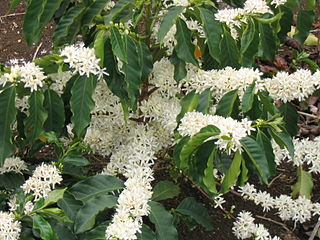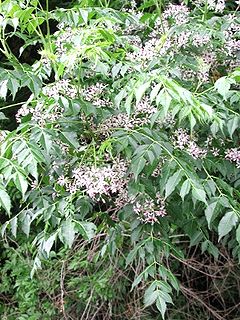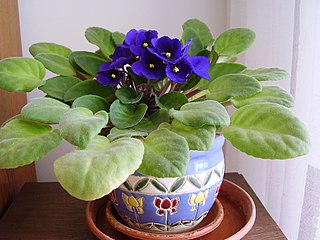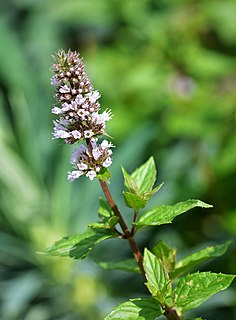
Coffea is a genus of flowering plants in the family Rubiaceae. Coffea species are shrubs or small trees native to tropical and southern Africa and tropical Asia. The seeds of some species, called coffee beans, are used to flavor various beverages and products. The fruits, like the seeds, contain a large amount of caffeine, and have a distinct sweet taste and are often juiced. The plant ranks as one of the world's most valuable and widely traded commodity crops and is an important export product of several countries, including those in Central and South America, the Caribbean and Africa.

The Ericaceae are a family of flowering plants, commonly known as the heath or heather family, found most commonly in acid and infertile growing conditions. The family is large, with c. 4250 known species spread across 124 genera, making it the 14th most species-rich family of flowering plants. The many well known and economically important members of the Ericaceae include the cranberry, blueberry, huckleberry, rhododendron, and various common heaths and heathers.

Meliaceae, the mahogany family, is a flowering plant family of mostly trees and shrubs in the order Sapindales.

Mangifera is a genus of flowering plants in the cashew family, Anacardiaceae. It contains approximately 69 species, with the best-known being the Common Mango. The center of diversity is in subtropical and tropical South Asia and Southeast Asia, while the highest number of species occur in India. They are generally canopy trees in lowland rainforests, reaching a height of 30–40 m (98–131 ft).

The Cyperaceae are a family of graminoid (grass-like), monocotyledonous flowering plants known as sedges. The family is large, with some 5,500 known species described in about 90 genera, the largest being the "true sedges" genus Carex with over 2,000 species.

The International Plant Names Index (IPNI) describes itself as "a database of the names and associated basic bibliographical details of seed plants, ferns and lycophytes." Coverage of plant names is best at the rank of species and genus. It includes basic bibliographical details associated with the names. Its goals include eliminating the need for repeated reference to primary sources for basic bibliographic information about plant names.

Trema is a genus of about 15 species of evergreen trees closely related to the hackberries (Celtis), occurring in subtropical and tropical regions of southern Asia, northern Australasia, Africa, South and Central America, and parts of North America. They are generally small trees, reaching 10–20 m (33–66 ft) tall.

Gesneriaceae, the gesneriad family, is a family of flowering plants consisting of about 152 genera and ca. 3,540 species in the tropics and subtropics of the Old World and the New World, with a very small number extending to temperate areas. Many species have colorful and showy flowers and are cultivated as ornamental plants.

Flora is all the plant life present in a particular region or time, generally the naturally occurring (indigenous) native plants. The corresponding term for animal life is fauna. Flora, fauna, and other forms of life, such as fungi, are collectively referred to as biota. Sometimes bacteria and fungi are also referred to as flora, as in the terms gut flora or skin flora.

Mammea is a flowering plant genus with about 70 species in the family Calophyllaceae. Its members are evergreen trees having edible fruits. The flowers are polygamous, with a unitary calyx opening into two or three valvate sepals. There are 4 to 8 petals. Berries are formed, containing 1 to 4 seeds. The leaves are rigid, coriaceous and often have pellucid dots.
Stachyandra is a plant genus in the family Picrodendraceae first described as a genus in 1990.
Malleastrum depauperatum is a species of plant in the family Meliaceae. It is endemic to Comoros and Aldabra in the Seychelles. It is also known by the synonym Malleastrum leroyi.
Malleastrum is a genus of plants in the family Meliaceae containing 21 species native to Madagascar, Comoros and Aldabra.

Naucleeae is a tribe of flowering plants in the family Rubiaceae and contains about 183 species in 24 genera. Species belonging to Naucleeae occur from Australasia, tropical Asia, Madagascar, tropical Africa, and to the Neotropics and North America.

Leroy Aziz Sané is a German professional footballer who plays as a winger for Bundesliga club Bayern Munich and the German national team.

Schizolaena is a genus of trees and shrubs in the family Sarcolaenaceae. They are endemic to Madagascar.
Perrierodendron is a genus of trees and shrubs in the family Sarcolaenaceae. They are endemic to Madagascar.
Gyrostipula is a genus of flowering plants in the family Rubiaceae. The genus is found on the Comoros and Madagascar.

Nepetoideae is a subfamily of plants in the family Lamiaceae.
Calodecaryia is a genus of flowering plants belonging to the family Meliaceae.













